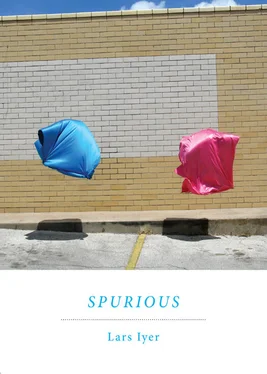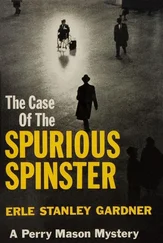For my part, W. notes, I still have a stupid excitement about books. It’s because I’m illiterate, W. says, and because they’re slightly above the level I can understand. Whenever I visit, I insist on opening the parcels and filling up W.’s shelves with fresh new books, reading him the most ridiculous of the blurbs. It must be the bright covers that attract me, W. says, whereas they depress him horribly. — ‘All these books!’, he says, with weary horror. ‘Look at them!’
Whatever happened to W.’s publisher? Once the most generous and gregarious of men, he insisted upon travelling hundreds of miles to visit W. and take him out to dinner. They spent days going over the manuscript, which was properly proofread (not like mine, W. says, which was farmed out to Malaysia). And he’d decided on a full colour cover for the paperback — an expensive undertaking, W. notes. Granted, the final version still had typos on the first page (to his amusement) and even in the blurbs on the back (which he found even funnier), but it was a handsome volume, and one of a series of handsome volumes.
But what’s happened to the publisher? He’s gone out of business, that much is clear. Of course, you could never get hold of his books anywhere, which also amused W. As soon as his book was in print, it was out of print, he said. It was always and already out of print, he said, which was fitting, he said. Luckily, he got a box of free copies, says W., which he sent to his friends. Were it not for that, no one would believe it had existed.
To W., it’s completely inconsequential whether the book is in print or not. You should always publish with friends, he says, and the publisher was a friend. But where is he? He doesn’t reply to emails or telephone calls, W. says. Doubtless there’s no longer a computer in his office, nor a telephone, he says. Doubtless the office has long been stripped and demolished, and he’s sitting sobbing in the ruins.
You should always publish with friends, W. notes, and that’s all he wants from his vanished publisher: a sign of friendship, of their shared failure. That’s all he would want from any of his friends, who are all failures, whether they know it or not.
Why has everything become so absurd? I ask W. Why has it all come apart just at the moment when we might have got somewhere? But W. reminds me of what we both know: that any success we’ve had is premised upon exactly that absurdity.
We’re like captains of the Titanic, we tell each other. W.’s already steered his ship into the iceberg. It’s wrecked — all hands lost. W. remains on the bridge, the last man standing, but there’s not long left. — ‘It’ll be your turn next’, says W. ‘How long do you think you’ll last?’
The iceberg’s looming, I tell W. I’m mesmerised by it. So was he, says W. He knew it was coming and that it could only come. He knew that any success he had had was premised upon this greater and pre-ordained failure. He’s dignified in defeat. — ‘Not like you’, he says, ‘gnashing your teeth and wailing from the rooftops’.
I am getting to know the moods of the damp, I tell W. The kitchen walls, still bare, sometimes seem to glower with anger: they become darker, browner. And then, at other times, they seem to lighten: the damp is in a good mood, or it has been dreamily distracted from the work of dampening. Is it a god that needs to be appeased, and if so, with what kind of sacrifice? But if it is a god, or part of a god, it is an inscrutable one; I follow its moods without being able to understand them.
Sometimes it darkens, it becomes browner, as though gathering itself up. Particularly, high up the wall, like a dark cloud spread all along — the damp becomes more intense. But it is not quite wet, not anymore. The surface is smooth, but not really moist; and it’s not running with water as it used to be. Dehumidifiers work night and day in the kitchen. Night and day, and though pinpricks of damp appear where there was once white plaster, dried out by the heater, the wall never grows wetter. Has the damp been conquered, or only contained?
The damp and I are companions in the quiet flat. Little happens here; the damp does its work as moisture is drawn through the filters of the dehumidifier into its transparent collection tray, and I try to do mine. When I am away, I tell W., I think the damp plunges forward like a dark wave; I can smell it, very thick in the air, when I open the door. Damp in a wave, welcoming me home, thick and brown and wet in the air.
Sometimes I sponge down the walls with a mixture of water and bleach. It needs to be done in the bathroom, too, where black spores of mould are forming. And the wallpaper in the bedroom, too. But these are only symptoms. I touch a cool sponge to the wall as to a fevered brow. Be calm, be still, do not toss and turn. And now I imagine the damp is a dream of the wall, that it is lost in itself somehow, and that if the wall were only to open its eyes and see me, then all would be well. But the wall seems to fall into itself. It’s lost in damp, or damp is what rises up when the wall disappears into its coma.
Sometimes, I tell W., I like to imagine that I could pick the walls up like a Chinese screen and turn them to the sun to dry. To lift up the ceiling and the flat above and let the sun find the wall, and dry it. That would let it live. That would awaken it. As it is, the wall is hunched upon itself and hidden from the sun. It weeps in a corner.
But how long for? I think warmer days are approaching, I tell W., though it was freezing today, and there were a few snowflakes in the air. Warmer days, and the simple honesty of the sun, which will bake everything dry. And if I cannot pick up the wall to turn it around, inner to outer, so there are no secrets anymore, nothing hidden, there is still the slow penetration of the sun, slow, and over the whole outer wall, rendered and unrendered. And one day it will be summer, too, in my kitchen.
The disaster has already happened, said W. during our presentation. That’s what we’re committed to, he said, meaning him and me. It’s already happened! It’s all finished! Can’t you see that it’s finished? But no one agreed with us. We’re quite alone, we agreed afterwards, walking to the train.
Alone with the apocalypse! The only thing for it is to drink. Luckily we have a bottle of Plymouth Gin in our bag. We are sober men, terribly sober, we agree. It’s only those who are the most sober of all who have to drink, and then to the point when they can no longer pronounce the word apocalypse . It’s only then, drunk as lords, that they will know God’s plan, which they will immediately forget.
Are we capable of religious belief? Of course not. We’re not capable of anything, that’s the trouble. We’re up against the apocalypse with no means to fight it. The disaster has already happened . We were born, for one thing. We’re going to die, that’s another. And the oceans will boil and the skies burn away into the outer darkness …
It’s all over, it’s all finished. This is the interregnum. A little reprieve, an Indian summer. But we’re deep into autumn, and winter is coming — or should that be the other way round? Deep into spring — a new kind of spring, a boiling spring — and a summer will come that will burn away everything.
Maybe it will come later, after we’re dead. Maybe sooner — tomorrow, or the day after tomorrow. But in another sense, it’s already come; it’s spread its cloak around us. We’re men of the End, of the Very End. We’re men of the Disaster, which no one else knows but us. Which no one else feels . Drink, drink, we have to drink. We unscrew the top of our gin bottle as the train rolls out of the station …
These are the End Times, but who knows it but us? No one. We’re quite alone with our knowledge, which is really a kind of feeling. We’re on our own, we decide. That’s what we have in common: a sense of the apocalypse. A sense that the time has come, and these are the days of our Judgement.
Читать дальше












